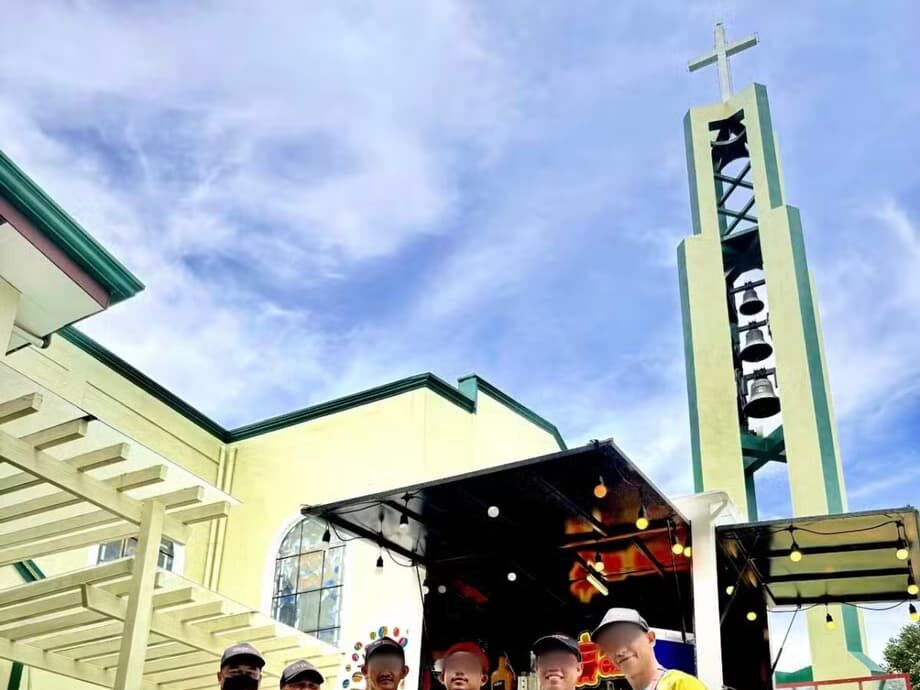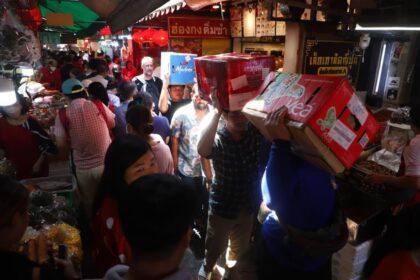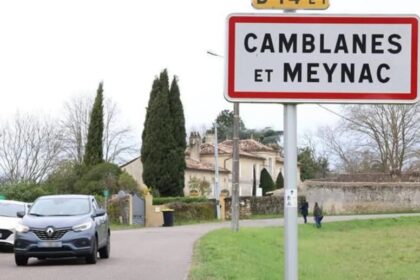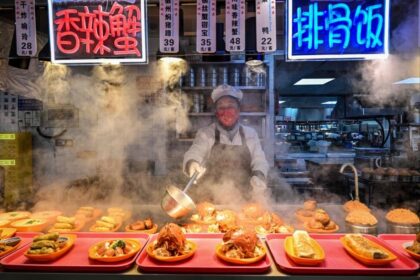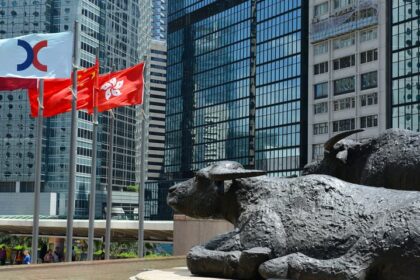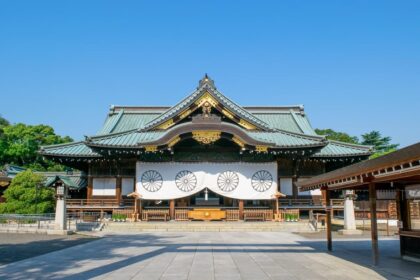Brewing second chances in Muntinlupa
Many Filipinos start the day with coffee. In a corner of Muntinlupa City, that daily ritual carries a different warmth. Ex-Preso, a mobile coffee cart staffed by Persons Restored to Liberty (PRLs), serves more than americanos and lattes. It offers dignity, income, and a path back to community life for people who stepped out of prison with little more than their names. Since launching in mid 2025, the cart has poured more than 6,000 cups. Each one is part of a quiet project run by the Philippine Jesuit Prison Service Foundation (PJPS) to support those rebuilding after incarceration.
- Brewing second chances in Muntinlupa
- How a donated cart became a program of restoration
- Life after prison in the Philippines: why reintegration is hard
- Inside Balaya: training the person and the barista
- From cart to community: where Ex-Preso serves
- Mark and Armel: personal journeys of change
- A PRL voice on being seen again
- Education and entrepreneurship: building toward ownership
- Restorative justice in action
- How to support and what comes next
- What to Know
The concept began without a business plan. When PJPS opened a formation house for newly released individuals, eight men entered a three month residency focused on healing and reintegration. A week later, someone donated a food cart. Volunteers sourced a coffee machine. Training followed. The cart became a platform where new skills, discipline, and public engagement could grow day by day.
For many who served long sentences, the first day outside can feel disorienting. Home dynamics have shifted, friends have moved on, and technology and jobs have changed. Ex-Preso turns early anxiety into structured work and steady interaction. The cart shows customers that a person can be more than the worst thing he did. It also helps participants regain simple routines, from showing up on time to greeting strangers without fear.
How a donated cart became a program of restoration
Ex-Preso is part of PJPS’s broader reintegration mission. The program connects livelihood to formation. Baristas receive coaching in coffee preparation, cash handling, customer service, and maintenance, alongside counseling and spiritual guidance. A cart that started as a gift quickly turned into a working classroom.
Fr. Jun-G Bargayo Jr., SJ, the executive director of PJPS, remembers the moment the idea took shape. He encouraged the men to try a simple enterprise tied to everyday life.
Fr. Jun-G Bargayo Jr., SJ, PJPS executive director: “Why not try coffee?” He later described the project as “not from a grand plan, but from grace.”
A reluctant name becomes a badge
At first, some participants felt uneasy about the name Ex-Preso. Their instinct was to hide their past and simply blend in at work. That changed when they served at a campus celebration of St. Ignatius. Customers welcomed them, smiled, and asked about the cart. The team leaned into the name with courage, turning a label once used against them into a statement of change.
Bookings grew from there. The cart began appearing at parish gatherings, school events, and community fairs. Exposure built confidence. It also carved out a space where the public could meet PRLs without judgment, one cup at a time.
Life after prison in the Philippines: why reintegration is hard
A person who finishes a sentence often faces life that is harder than confinement. In the Philippines, former inmates, called PRLs, must secure identification, find housing, and look for work with a record that follows them. Employers may hesitate. Families can be distant. Old acquaintances might tempt a return to the habits that led to prison. Many people leave custody with limited savings and few job references.
PJPS has long worked with people in and around the national penitentiary in Muntinlupa. Inside, individuals are called Persons Deprived of Liberty (PDLs). Once released, they are called Persons Restored to Liberty, a term that signals hope and responsibility. The shift in language matters. It helps set a tone for reintegration that centers on healing rather than stigma.
Ex-Preso addresses these challenges by pairing a real job with a support system. The cart gives structure and a visible role in the community. Training sessions weave in practical lessons such as budgeting, conflict resolution, and basic entrepreneurship. Confidence returns slowly. The apron and name tag become symbols of a new start.
Inside Balaya: training the person and the barista
Participants begin at Balaya, the PJPS formation house whose name blends the Filipino words for house and freedom. The residency lasts around three months. It focuses on prayer, work routines, peer support, and practical life skills. The pace is steady and intentional. The design recognizes that freedom takes practice.
Skills that support work
Barista training covers grinding, tamping, calibration, milk steaming, and machine upkeep. Service is as important as technique. Trainees practice greeting customers, handling payments, and staying calm during busy periods. They learn to maintain a cart and troubleshoot common equipment issues. A person who has not used a point of sale device in years learns to take orders on a tablet. Someone who has never measured yields learns to dial in espresso. Small achievements add up to a sense of competence.
Ex-Preso also stresses trust and accountability. Participants track inventory and costs, set goals for the day, and document sales. These habits make the cart sustainable and build a foundation for future ventures. The aim is not to create lifetime employees. The aim is to prepare co owners and independent workers who can take this experience into other paths.
Careful selection and support
PJPS screens candidates to ensure they are ready for a community setting. Staff look for people who show openness to learning and a willingness to stick with the formation process. The rhythm of the program, from morning routines to evening reflections, is meant to restore order after years of instability.
That rhythm also builds mental and emotional health. Counseling and accompaniment help participants process guilt, anxiety, and fears about rejection. Many PRLs say that being treated as trusted workers, even in a small cart, helps them feel human again.
From cart to community: where Ex-Preso serves
Visibility changes stories. Ex-Preso began serving in a parish compound and at school events. The team later brewed coffee for public gatherings, including large institutional functions. At one point they served at the Supreme Court. These moments raise morale. A barista who once avoided eye contact now speaks proudly about flavor notes and brew ratios. Customers discover a good cup and a good story at the same time.
Revenue sustains the project. Clients can book the cart for events. Donations help subsidize training, transportation, and equipment upkeep. Proceeds feed back into the residency program and provide allowances or stipends for the workers. The model is simple. The more events the cart serves, the more people it can train and support.
Public reception has been encouraging. At pop ups, the line often includes people who come for coffee and stay to talk. Some ask how to volunteer or sponsor a booking. Others simply hand over small tips and words of thanks. Those interactions reinforce the core message that past mistakes do not erase a person’s worth.
Mark and Armel: personal journeys of change
Mark left prison after more than six years with little confidence and few skills. He doubted that he could manage a cart or handle customers. Within weeks at Ex-Preso, he learned to pull consistent shots, operate safely, and even repair minor issues with the machine. He also learned to drive. Honest work brought a paycheck and a sense of pride. The moment that mattered most came at home when his mother told him she was proud. He now says the small routines of the cart, from wiping counters to greeting regulars, helped him feel seen again.
Armel spent 21 years behind bars. While incarcerated, he earned a commerce degree with an entrepreneurship major and volunteered as a teacher. Freedom felt overwhelming at first. He admitted he prayed for release but should have prayed to be ready. Ex-Preso offered him a safe structure to heal, serve, and build routines before fully returning to family life. He now brews a signature drink, the C ARMEL Macchiato, and speaks about quiet goals: a small home, steady support for his child, and a chance to mentor others who need a first step.
Stories like these do not ignore the past. They show steady work in the present. By showing up, meeting strangers, and delivering a product people enjoy, PRLs gather proof for themselves and their families that change is possible. Every shift on the cart becomes practice in patience and accountability.
A PRL voice on being seen again
Many PRLs say the hardest part of reentry is feeling invisible or judged. One Ex-Preso barista, Ryan Jay Gorospe, described how the cart changed the way his loved ones looked at him. He spoke in Filipino during a recent interview. Below is an English translation of his words.
Ryan Jay Gorospe, Ex-Preso barista and PRL: “People who once ignored me started to come back. When Ex-Preso arrived, they saw the change happening in our lives. We still have worth. We still have a mission. We want to prove what more we can do now and in the days ahead.”
That sentiment appears often at the cart. Family members visit to taste a latte. Former neighbors stop by to say they are glad to see someone working honestly and smiling behind the counter. Small gestures accumulate. A second shift is offered. A new booking is secured. The next trainee arrives at Balaya with hope.
Education and entrepreneurship: building toward ownership
One strength of Ex-Preso is its link to education. Inside prison, many PDLs enroll in extension courses, including entrepreneurship programs offered by partner schools. Some finish degrees while serving sentences. The transition from lessons on business planning to daily tasks on the cart is natural. Workers learn to apply costs, pricing, and basic marketing in a real setting.
PJPS wants baristas to progress from trainees to co owners. That goal is practical. A person who shares ownership has stake in bookings, maintenance, and service. Co ownership also demonstrates trust. It tells a worker that society sees him not only as labor but as a partner. The cart becomes a seed for small businesses that PRLs can run in their own neighborhoods.
Ownership takes time. It requires savings, steady bookings, and customer loyalty. It also requires more trained baristas ready to step in so that early graduates can branch out. The team continues to build that pipeline at Balaya.
Restorative justice in action
Ex-Preso sits inside a wider effort to rebuild lives affected by incarceration. PJPS, a ministry with decades of presence in Muntinlupa, supports families, assists PDLs inside, and walks with people as they step into freedom. The approach is restorative. It looks for ways to repair relationships, restore dignity, and strengthen communities while being honest about harms caused.
Key PJPS programs include:
- Scholarship support for children of people in prison, from grade school through college
- Socio pastoral activities such as letter writing, counseling, meals, and medical missions, with focus on elderly and indigent PDLs
- PRL Care, which welcomes newly released individuals and helps with documents, housing, and job readiness
- Advocacy and education on penal and judicial reform and on the limits of a purely punitive model
Ex-Preso links all these parts. The cart funds formation, gives alumni a role, and serves as a visible invitation for the public to engage in reintegration. It is a working sign of what restorative justice looks like at street level.
How to support and what comes next
Community participation fuels Ex-Preso. Offices and schools can book the cart for events. Families can arrange small gatherings where the baristas set up and serve. Individuals can sponsor training days or contribute to equipment maintenance. Those who want to help can also volunteer time or expertise in areas like bookkeeping, marketing, or machine repair.
The foundation keeps a simple public page where people can learn more about programs and ways to get involved. For details or to inquire about bookings, visit the PJPS website at pjps.org.ph. Each booking supports the next cohort at Balaya. Each cup keeps the work going.
What to Know
- Ex-Preso is a mobile coffee cart in Muntinlupa City staffed by Persons Restored to Liberty
- The project began when a food cart was donated to PJPS, which runs a three month formation program for newly released individuals
- More than 6,000 cups have been served since mid 2025, with proceeds supporting training and PRL stipends
- Barista training includes coffee skills, customer service, budgeting, and equipment care, paired with counseling and spiritual formation
- The cart has served at schools, parishes, and major institutions, helping build public acceptance
- Participants aim to become co owners of carts as they progress from trainees to small business operators
- PJPS also supports families of PDLs through scholarships and community services, and advocates for restorative approaches to justice
- Bookings and donations help sustain the program and fund future cohorts at Balaya


